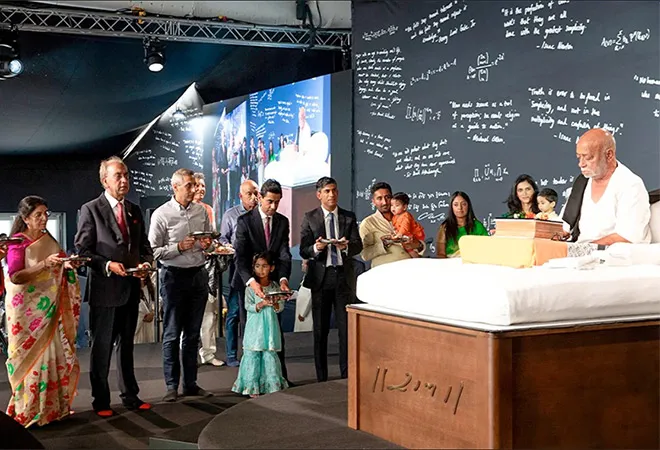The University of Cambridge in England is known for many things - its academic credentials, its world-class status of learning, its vibrant student life and its alums - the creme de la creme of global elites. But few would have thought that a recitation of the Ramayana in Cambridge would also generate global headlines. India's renowned spiritual leader, Morari Bapu, conducted a nine-day Ram Katha at Jesus College, University of Cambridge last week, and it saw the participation of Britain's first Hindu Prime Minister, Rishi Sunak, on Independence Day.
Sunak, who has never been shy of his faith, spoke eloquently about how it guides him in one of the most challenging jobs in the world. "I am here today not as a Prime Minister, but as a Hindu," said Sunak as he sought Bapu's blessings and underlined that his Hindu faith guides him in every aspect of his life and gives him the courage to do his best as the Prime Minister of Britain. He talked about how a "golden Ganesha sits gleefully on my desk at 10 Downing Street" as a "constant reminder to me about listening and reflecting on issues before acting". Sunak even chanted "Jai Siya Ram" and participated in an aarti on stage. Bapu's response has been equally warm as he underlined how "the humility with which PM Sunak approached the Vyaspeeth and conveyed his respect only underscores the virtues of his culture".
Sunak has always been unequivocal in embracing his Hindu identity. As far back as 2017, he had declared: "I am now a citizen of Britain. But my religion is Hindu. My religious and cultural heritage is Indian. I proudly say that I am a Hindu and my identity is also a Hindu." He not only took his oath in 2020 on the Bhagavad Gita, he has performed gau puja and has been seen wearing the kalawa (sacred red thread). He has celebrated Indian festivals like Diwali and Janmashtami with fervor. When Sunak as Chancellor had lit candles to mark Diwali on the doorstep of No 11 Downing Street, he had described it as one of his "proudest moments."
Not surprisingly, Sunak remains the favorite of the Indian diaspora in the UK, which is one of the largest ethnic minorities in the country, coming close to 1.5 million people. This diaspora is now also becoming politically conscious and in Sunak it sees its own rise as a confident self-assured constituency which is increasingly willing to shape the destiny of their nation more actively.
Sunak's rise is as much a tribute to his own grit and determination and the success of the Indian diaspora as it is to the rapidly evolving nature of the British politics. That the first ethnic minority Prime Minister of the United Kingdom would be a Conservative would have been unthinkable just a few years back. But the Conservative Party has managed to modernize itself by reaching out to ethnic minorities in a sustained manner since the days of David Cameron and this has paid dividends. Sunak's comfort with his religious identity in some ways gels with values that the Tories hold dear - cultural rootedness. And his Prime Ministership has certainly brought some calm to the rank and file of the Tories, which was getting torn asunder by the shenanigans of Boris Johnson.
Sunak's rise is as much a tribute to his own grit and determination and the success of the Indian diaspora as it is to the rapidly evolving nature of the British politics.
But the Conservatives are facing a tough political environment. Just a month back, Sunak's party took a beating and rival Labour Party and Liberal Democrats made some serious gains in the England local elections. The Tories also lost two safe seats in by-elections with huge margins to their political opponents, underscoring the deep electoral trouble the party finds itself in. The cost of living is spiraling and there is pessimism about the future of the British economy. The Tories are no longer seen as the party of governance with the famed British public services facing an all-round collapse. And the emotive issue of Brexit is no longer generating political dividend for the party. In fact, it is fast becoming a liability with some voters questioning how things could go this wrong so rapidly.
For Sunak, it's going to be a tall order to build a winning coalition before next year's election. There are already predictions about the Tories facing a cataclysmic defeat in the 2024 general election. Despite falling far behind the Labour Party in opinion polls, Sunak continues to maintain that the Conservatives can still win the next general election and that the next election was not a "done deal" for Labour. He has delineated five key priorities of his government - bringing down inflation, growing the economy, reducing debt and NHS waiting times, and stopping small boat crossings to control immigration. But he has not been able to deliver on most and time is running out for him.
For all of Sunak's achievements so far, he faces tough political challenges ahead. And it is in times like these that faith becomes an anchor, helping to navigate the turbulence around and within. While his faith may be deeply personal for Sunak, its public demonstration is also a message to the wider Indian diaspora that its support will be key for the British Prime Minister as he enters the last few difficult months of his premiership.
This commentary originally appeared in NDTV.
The views expressed above belong to the author(s). ORF research and analyses now available on Telegram! Click here to access our curated content — blogs, longforms and interviews.

